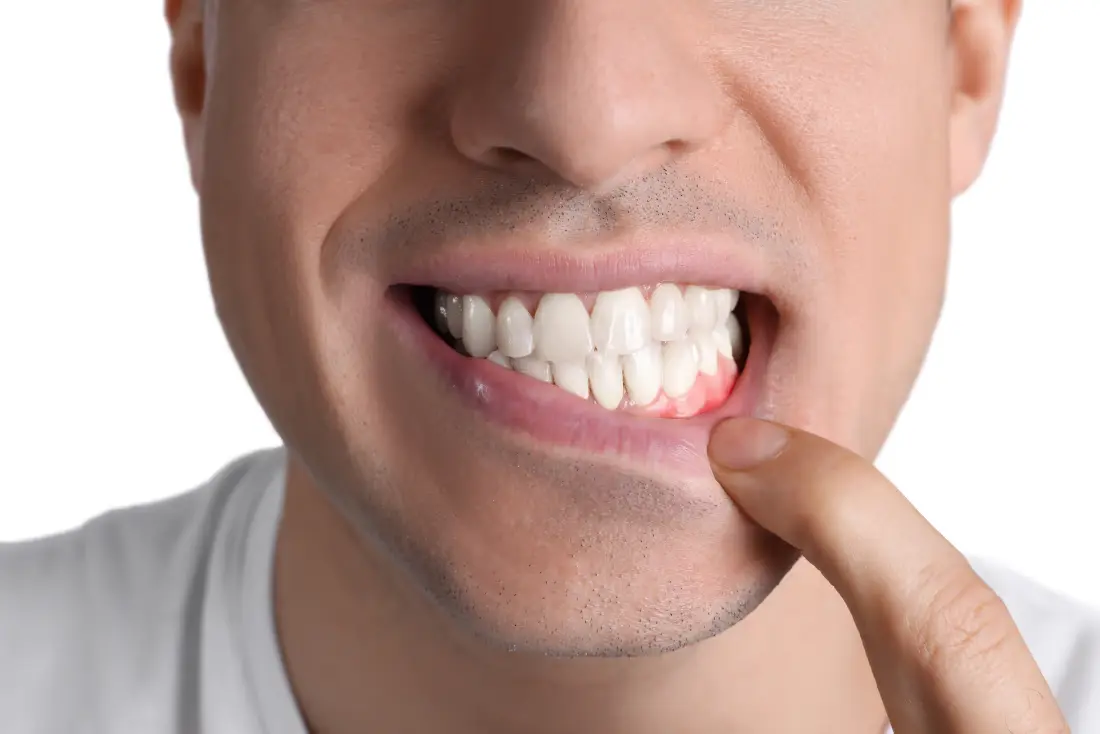Gum Recession

Gum, or gingival, recession is a serious condition that most commonly occurs in adults over 40 but can begin in the teenage years. Gum recession refers to the progressive loss of gum tissue. It is difficult to self-diagnose gum recession because it can occur gradually and asymptomatically.
If left untreated, receding gums can result in tooth root exposure, extreme sensitivity, and other avoidable symptoms. To prevent gum recession, make sure to schedule regular dental checkups and assess risk factors.
If you are experiencing any of the following symptoms, you may be suffering from gum recession and should visit the dentist as soon as possible:
- Longer-looking teeth - Gum recession does not actually affect the length of the teeth, but recedes the gums, revealing more of the teeth and making them look longer than normal. People with receding gums often have a “toothy” smile.
- Sensitive teeth - If gums are allowed to recede enough, the cementum that protects the roots of the teeth will be exposed and the dentin tubules will become more susceptible to external stimuli.
- Halitosis, inflammation, and bleeding - These are common symptoms of periodontal disease, gingivitis, and gum recession. Bacterial infection can lead to receding gums and tissue damage, as well as loose teeth and tooth loss.
- Visible roots - More severe cases of gum recession can expose the roots of the teeth.
What causes gum recession?
Gum recession occurs due to underlying causes that must be dealt with before the gums can be treated. For instance, excess sugar in the mouth and narrowed blood vessels in diabetic patients create the perfect environment for the colonization of bacteria and receding gums.
Gum recession is a common condition that dentists diagnose and treat daily and can be caused by daily habits that you don’t give a second thought.
Gingival recession is most commonly caused by:
- Chewing tobacco - Tobacco in any form will lead to devastating effects on the health of the oral cavity. Chewing tobacco is especially harmful because of its prolonged contact with and aggravation of the gingival lining of the mouth.
- Overaggressive brushing - Brushing too hard or using a hard-bristled toothbrush on a daily basis will gradually erode the tooth enamel at the gum line and inflame or irritate the gum tissue. Brushing too hard is almost as dangerous as not brushing at all.
- Poor oral hygiene - When plaque is allowed to build up in the mouth due to improper or nonexistent brushing and flossing, harmful bacteria and toxins will erode the underlying jawbone and promote infection.
- Periodontal disease - This occurs when there is a large buildup of excess bacteria that causes infection and harm to the bone and gum tissues. Periodontal disease can eventually lead to tooth loss.
How is gum recession treated?
Before treatment of gum recession can begin, the underlying cause must be dealt with. For instance, if receding gums are caused by poor oral hygiene, the dentist may perform a professional dental cleaning, prophylaxis, to rid the gum pockets of bacteria and debris. If there is a severe calculus or tartar build-up, the dentist will perform scaling and root planing procedures. If receding gums are caused by aggressive brushing, the dentist will provide a soft-bristled toothbrush and instruct the patient in gentle brushing techniques.
After the underlying cause is dealt with, there are many treatment options for receding gums that dentists can offer. Two common treatments include gum grafting and gum tissue regeneration which can restore the natural symmetry to the gums and make the smile look aesthetically pleasing. Cosmetic or restorative surgery might also be recommended.
To ask your questions about gum recession, periodontal disease, and treatment options, please contact us at Brooklyn Dental Spa. Our dentists and dental hygienists are happy to help.